六级听力讲座
- 格式:docx
- 大小:23.56 KB
- 文档页数:5

六级听力讲座解题技巧六级听力讲座解题技巧六级听力中的讲座部分,就像是一场知识的盛宴,但这个盛宴可不是那么容易就能享受的。
要想在这部分拿到好分数,可得有点小技巧。
咱们先说说这听力讲座的特点。
它就像是一个知识渊博的老者在滔滔不绝地讲述各种知识,从科学到文化,从历史到艺术,那内容是五花八门。
它的语速啊,有时候就像开了小马达,“嘟嘟嘟”地不停。
而且那词汇量,有些词就像外星语一样,特别生僻。
这可咋整呢?在听之前啊,咱得有点准备工作。
你不能两手空空就去“打仗”吧?这就好比你去参加一场寻宝游戏,你得先知道大概的宝藏范围吧。
对于听力讲座,你得快速浏览一下题目和选项。
这可不是随便看看,这就像侦探找线索一样。
你得从那些选项里挖出点有用的东西。
比如说,如果选项里都是关于某种科学现象的名词,那你心里就得有个底,这讲座很可能就是围绕这个科学现象展开的。
有时候啊,你还能从选项里猜出个大概的主题方向,这就像是在黑暗里找到了一盏小灯,能给你指引个方向。
开始听的时候呢,注意力得高度集中。
这就像是你在看一场特别精彩的魔术表演,眼睛一眨都不敢眨。
你得抓住那些关键的信号词。
这些信号词就像是路标,能告诉你接下来要讲的内容是啥。
比如说“firstly”“secondly”,不过咱刚说不能用那些承接词哈,那像“in addition”这样的词不能用,但是像“important”“key”“main”这些表示重要性的词可就是很关键的信号啦。
一旦听到这些词,你就得像小雷达一样,立刻捕捉后面的信息。
这就好比你在森林里听到了鸟儿的特别叫声,你就知道那附近肯定有啥特别的东西。
还有啊,做笔记是个超级重要的技能。
你可别小看这个做笔记,这就像你在海边捡贝壳,听到啥有用的就赶紧捡起来放到自己的小篮子里。
不过这个笔记可不能乱写,要简洁又准确。
比如说,听到一个关于历史事件的年份、人物名字、主要事件,你就简单地写几个关键词。
可别整句整句地写,那速度哪跟得上啊。
这笔记就像是你的小助手,在后面答题的时候能帮你大忙呢。
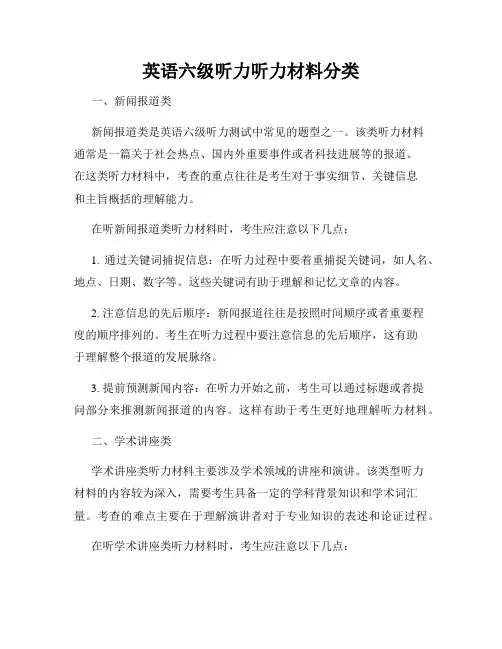
英语六级听力听力材料分类一、新闻报道类新闻报道类是英语六级听力测试中常见的题型之一。
该类听力材料通常是一篇关于社会热点、国内外重要事件或者科技进展等的报道。
在这类听力材料中,考查的重点往往是考生对于事实细节、关键信息和主旨概括的理解能力。
在听新闻报道类听力材料时,考生应注意以下几点:1. 通过关键词捕捉信息:在听力过程中要着重捕捉关键词,如人名、地点、日期、数字等。
这些关键词有助于理解和记忆文章的内容。
2. 注意信息的先后顺序:新闻报道往往是按照时间顺序或者重要程度的顺序排列的。
考生在听力过程中要注意信息的先后顺序,这有助于理解整个报道的发展脉络。
3. 提前预测新闻内容:在听力开始之前,考生可以通过标题或者提问部分来推测新闻报道的内容。
这样有助于考生更好地理解听力材料。
二、学术讲座类学术讲座类听力材料主要涉及学术领域的讲座和演讲。
该类型听力材料的内容较为深入,需要考生具备一定的学科背景知识和学术词汇量。
考查的难点主要在于理解演讲者对于专业知识的表述和论证过程。
在听学术讲座类听力材料时,考生应注意以下几点:1. 理清主题和论述结构:在听力过程中要注意抓住讲座的主题和论述结构,这有助于考生理解讲座的内容和逻辑关系。
2. 知识储备和词汇积累:考生需要提前积累相关学科的词汇和背景知识,以便能够更好地理解和掌握听力材料。
3. 抓住重点和关键信息:学术讲座的内容往往比较繁琐,考生在听力过程中要注意抓住核心观点和关键信息,避免被细节所迷惑。
三、实用信息类实用信息类听力材料通常包括广告、导游介绍、公告通知等,主要涉及日常生活、旅游、购物等方面的信息。
该类听力材料的特点是简短明了,考查的重点是考生对于重要信息和指示的理解能力。
在听实用信息类听力材料时,考生应注意以下几点:1. 抓住关键信息和指示:实用信息类听力材料往往包含重要的指示和步骤,考生要注意抓住关键信息和指示,以便能够正确地理解和执行。
2. 理解场景背景和语境:在听实用信息类听力材料时,考生要通过语境和场景背景来推测信息的含义和用途,以便更好地理解听力材料。
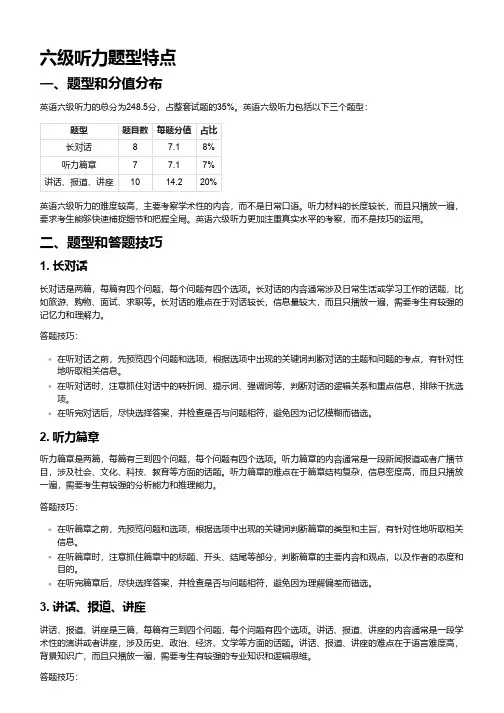
六级听力题型特点一、题型和分值分布英语六级听力的总分为248.5分,占整套试题的35%。
英语六级听力包括以下三个题型:题型题目数每题分值占比长对话87.18%听力篇章77.17%讲话、报道、讲座1014.220%英语六级听力的难度较高,主要考察学术性的内容,而不是日常口语。
听力材料的长度较长,而且只播放一遍,要求考生能够快速捕捉细节和把握全局。
英语六级听力更加注重真实水平的考察,而不是技巧的运用。
二、题型和答题技巧1. 长对话长对话是两篇,每篇有四个问题,每个问题有四个选项。
长对话的内容通常涉及日常生活或学习工作的话题,比如旅游、购物、面试、求职等。
长对话的难点在于对话较长,信息量较大,而且只播放一遍,需要考生有较强的记忆力和理解力。
答题技巧:在听对话之前,先预览四个问题和选项,根据选项中出现的关键词判断对话的主题和问题的考点,有针对性地听取相关信息。
在听对话时,注意抓住对话中的转折词、提示词、强调词等,判断对话的逻辑关系和重点信息,排除干扰选项。
在听完对话后,尽快选择答案,并检查是否与问题相符,避免因为记忆模糊而错选。
2. 听力篇章听力篇章是两篇,每篇有三到四个问题,每个问题有四个选项。
听力篇章的内容通常是一段新闻报道或者广播节目,涉及社会、文化、科技、教育等方面的话题。
听力篇章的难点在于篇章结构复杂,信息密度高,而且只播放一遍,需要考生有较强的分析能力和推理能力。
答题技巧:在听篇章之前,先预览问题和选项,根据选项中出现的关键词判断篇章的类型和主旨,有针对性地听取相关信息。
在听篇章时,注意抓住篇章中的标题、开头、结尾等部分,判断篇章的主要内容和观点,以及作者的态度和目的。
在听完篇章后,尽快选择答案,并检查是否与问题相符,避免因为理解偏差而错选。
3. 讲话、报道、讲座讲话、报道、讲座是三篇,每篇有三到四个问题,每个问题有四个选项。
讲话、报道、讲座的内容通常是一段学术性的演讲或者讲座,涉及历史、政治、经济、文学等方面的话题。
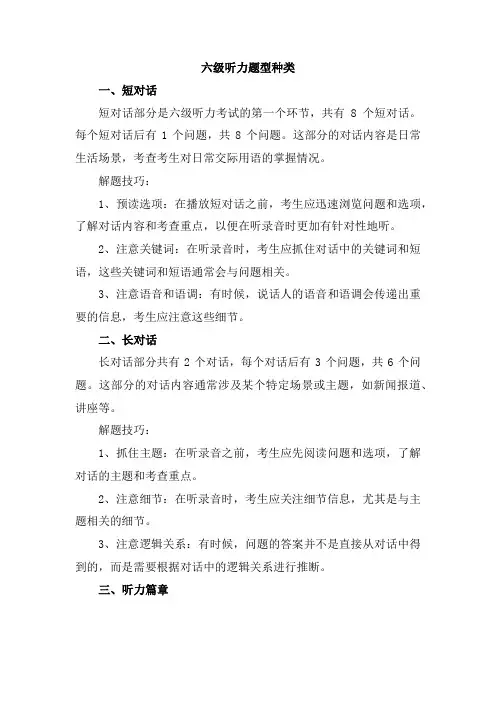
六级听力题型种类一、短对话短对话部分是六级听力考试的第一个环节,共有8个短对话。
每个短对话后有1个问题,共8个问题。
这部分的对话内容是日常生活场景,考查考生对日常交际用语的掌握情况。
解题技巧:1、预读选项:在播放短对话之前,考生应迅速浏览问题和选项,了解对话内容和考查重点,以便在听录音时更加有针对性地听。
2、注意关键词:在听录音时,考生应抓住对话中的关键词和短语,这些关键词和短语通常会与问题相关。
3、注意语音和语调:有时候,说话人的语音和语调会传递出重要的信息,考生应注意这些细节。
二、长对话长对话部分共有2个对话,每个对话后有3个问题,共6个问题。
这部分的对话内容通常涉及某个特定场景或主题,如新闻报道、讲座等。
解题技巧:1、抓住主题:在听录音之前,考生应先阅读问题和选项,了解对话的主题和考查重点。
2、注意细节:在听录音时,考生应关注细节信息,尤其是与主题相关的细节。
3、注意逻辑关系:有时候,问题的答案并不是直接从对话中得到的,而是需要根据对话中的逻辑关系进行推断。
三、听力篇章听力篇章部分共有3篇短文,每篇短文后有3个问题,共9个问题。
这部分的短文内容涉及社会、文化、科技等各个领域,难度较高。
解题技巧:1、阅读选项:在播放短文之前,考生应快速浏览问题和选项,了解短文的主题和考查重点。
2、注意关键词:在听录音时,考生应抓住文章中的关键词和短语,这些关键词和短语通常会与问题相关。
3、注意语调和语气:有时候,说话人的语调和语气会传递出重要的信息,考生应注意这些细节。
4、注意上下文:有时候,问题的答案需要在上下文中寻找线索,考生应注意文章中的逻辑关系和细节信息。
四、讲座/讲话讲座/讲话部分是一个较长的录音片段,通常是一位教授或专业人士就某个特定主题进行讲解或发表演讲。
这部分的录音内容通常较为正式和专业。
解题技巧:1、抓住主题:在听录音之前,考生应先阅读问题和选项,了解讲座/讲话的主题和考查重点。
2、注意细节:在听录音时,考生应关注细节信息,尤其是与主题相关的细节。
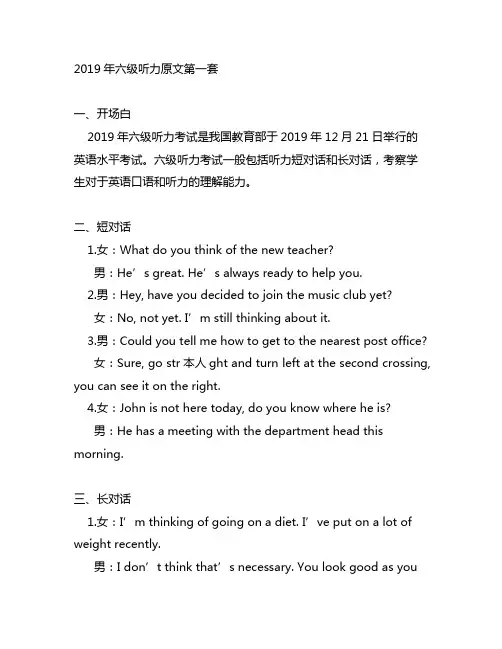
2019年六级听力原文第一套一、开场白2019年六级听力考试是我国教育部于2019年12月21日举行的英语水平考试。
六级听力考试一般包括听力短对话和长对话,考察学生对于英语口语和听力的理解能力。
二、短对话1.女:What do you think of the new teacher?男:He’s great. He’s always ready to help you.2.男:Hey, have you decided to join the music club yet?女:No, not yet. I’m still thinking about it.3.男:Could you tell me how to get to the nearest post office?女:Sure, go str本人ght and turn left at the second crossing, you can see it on the right.4.女:John is not here today, do you know where he is?男:He has a meeting with the department head this morning.三、长对话1.女:I’m thinking of going on a diet. I’ve put on a lot of weight recently.男:I don’t think that’s necessa ry. You look good as youare.女:Thanks for saying that, but I’m going to do it anyway.2.男:Do you know when the library is open?女:I think it’s open from 8 in the morning to 10 at night, but you’d better check their website for the exact ti me.男:Thanks, I’ll do that.四、总结2019年六级听力原文第一套中的短对话和长对话内容涵盖了日常生活中常见的场景,考察考生对于基本口语和日常情景的理解和表达能力。
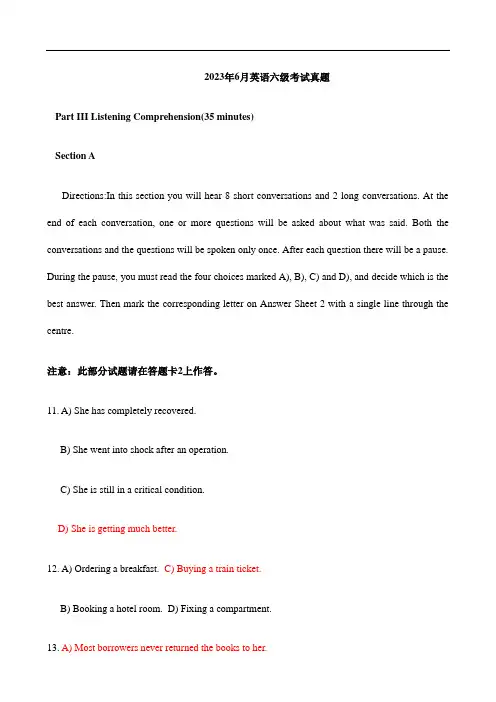
2023年6月英语六级考试真题Part III Listening Comprehension(35 minutes)Section ADirections:In this section you will hear 8 short conversations and 2 long conversations. At the end of each conversation, one or more questions will be asked about what was said. Both the conversations and the questions will be spoken only once. After each question there will be a pause. During the pause, you must read the four choices marked A), B), C) and D), and decide which is the best answer. Then mark the corresponding letter on Answer Sheet 2 with a single line through the centre.注意:此部分试题请在答题卡2上作答。
11. A) She has completely recovered.B) She went into shock after an operation.C) She is still in a critical condition.D) She is getting much better.12. A) Ordering a breakfast. C) Buying a train ticket.B) Booking a hotel room. D) Fixing a compartment.13. A) Most borrowers never returned the books to her.B) The man is the only one who brought her book back.C) She never expected anyone to return the books to her.D) Most of the books she lent out came back without jackets.14. A) She left her work early to get some bargains last Saturday.B) She attended the supermarket’s grand opening ceremony.C) She drove a full hour before finding a parking space.D) She failed to get into the supermarket last Saturday.15. A) He is bothered by the pain in his neck.B) He cannot do his report without a computer.C) He cannot afford to have a coffee break.D) He feels sorry to have missed the report.16. A) Only top art students can show their works in the gallery.B) The gallery space is big enough for the man’s paintings.C) The woman would like to help with the exhibition layout.D) The man is uncertain how his art works will be received.17. A) The woman needs a temporary replacement for her assistant.B) The man works in the same department as the woman does.C) The woman will have to stay in hospital for a few days.D) The man is capable of dealing with difficult people.18. A) It was better than the previous one.B) It dist orted the mayor’s speech.C) It exaggerated the city’s economy problems.D) It reflected the opinions of most economists.Questions 19 to 22 are based on the conversation you have just heard.19. A) To inform him of a problem they face.B) To request him to purchase control desks.C) To discuss the content of a project report.D) To ask him to fix the dictating machine.20. A) They quote the best price in the market.B) They manufacture and sell office furniture.C) They cannot deliver the steel sheets on time.D) They cannot produce the steel sheets needed21. A) By marking down the unit price.B) By accepting the penalty clauses.C) By allowing more time for delivery.D) By promising better after-sales service.22. A) Give the customer a ten percent discount.B) Claim compensation from the steel suppliers.C) Ask the Buying Department to change suppliers.D) Cancel the contract with the customer.Questions 23 to 25 are based on the conversation you have just heard.23. A) Stockbroker. C) Mathematician.B) Physicist. D) Economist.24. A) Improve computer programming.B) Predict global population growth.C) Explain certain natural phenomena.D) Promote national financial health.25. A) Their different educational backgrounds.B) Changing attitudes toward nature.C) Chaos theory and its applications.D) The current global economic crisis.Section BDirections: In this section you will hear 3 short passages. At the end of each passage, you will hear some questions. Both the passage and the questions will be spoken only once. After you hear a question, you must choose the best answer from the four choices marked A), B), C) and D). Then mark the corresponding letter on Answer Sheet 2 with a single line through the centre.注意:此部分试题请在答题卡2上作答。
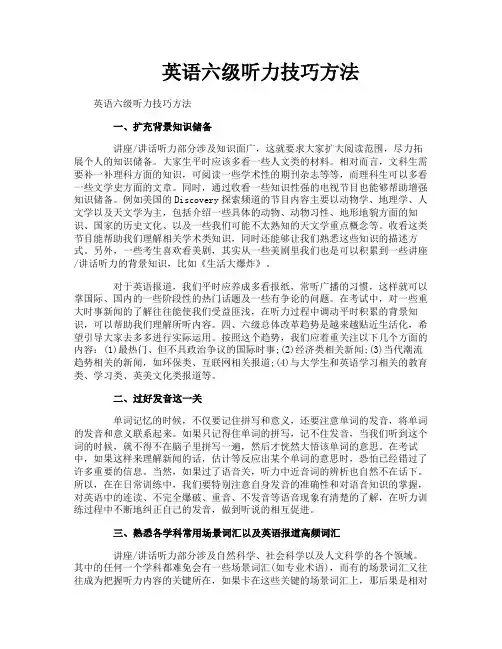
英语六级听力技巧方法英语六级听力技巧方法一、扩充背景知识储备讲座/讲话听力部分涉及知识面广,这就要求大家扩大阅读范围,尽力拓展个人的知识储备。
大家生平时应该多看一些人文类的材料。
相对而言,文科生需要补一补理科方面的知识,可阅读一些学术性的期刊杂志等等,而理科生可以多看一些文学史方面的文章。
同时,通过收看一些知识性强的电视节目也能够帮助增强知识储备。
例如美国的Discovery探索频道的节目内容主要以动物学、地理学、人文学以及天文学为主,包括介绍一些具体的动物、动物习性、地形地貌方面的知识、国家的历史文化、以及一些我们可能不太熟知的天文学重点概念等。
收看这类节目能帮助我们理解相关学术类知识,同时还能够让我们熟悉这些知识的描述方式。
另外,一些考生喜欢看美剧,其实从一些美剧里我们也是可以积累到一些讲座/讲话听力的背景知识,比如《生活大爆炸》。
对于英语报道,我们平时应养成多看报纸,常听广播的习惯,这样就可以掌国际、国内的一些阶段性的热门话题及一些有争论的问题。
在考试中,对一些重大时事新闻的了解往往能使我们受益匪浅,在听力过程中调动平时积累的背景知识,可以帮助我们理解所听内容。
四、六级总体改革趋势是越来越贴近生活化,希望引导大家去多多进行实际运用。
按照这个趋势,我们应着重关注以下几个方面的内容:(1)最热门、但不具政治争议的国际时事;(2)经济类相关新闻;(3)当代潮流趋势相关的新闻,如环保类、互联网相关报道;(4)与大学生和英语学习相关的教育类、学习类、英美文化类报道等。
二、过好发音这一关单词记忆的时候,不仅要记住拼写和意义,还要注意单词的发音,将单词的发音和意义联系起来。
如果只记得住单词的拼写,记不住发音,当我们听到这个词的时候,就不得不在脑子里拼写一遍,然后才恍然大悟该单词的意思。
在考试中,如果这样来理解新闻的话,估计等反应出某个单词的意思时,恐怕已经错过了许多重要的信息。
当然,如果过了语音关,听力中近音词的辨析也自然不在话下。
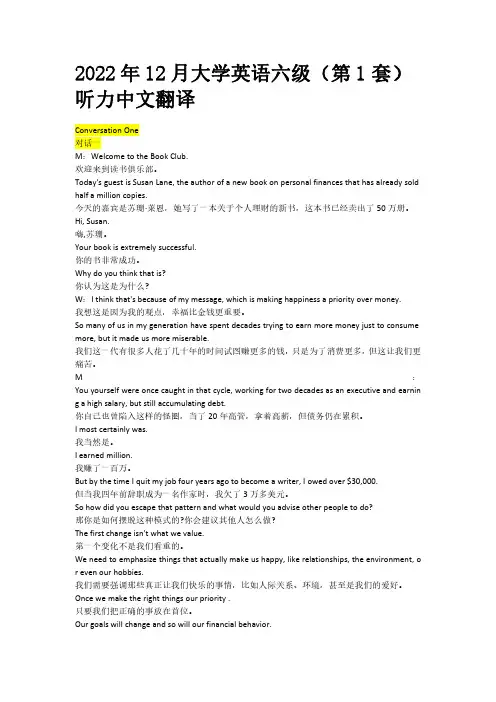
2022年12月大学英语六级(第1套)听力中文翻译Conversation One对话一M:Welcome to the Book Club.欢迎来到读书俱乐部。
Today's guest is Susan Lane,the author of a new book on personal finances that has already sold half a million copies.今天的嘉宾是苏珊·莱恩,她写了一本关于个人理财的新书,这本书已经卖出了50万册。
Hi,Susan.嗨,苏珊。
Your book is extremely successful.你的书非常成功。
Why do you think that is?你认为这是为什么W:I think that's because of my message,which is making happiness a priority over money.我想这是因为我的观点,幸福比金钱更重要。
So many of us in my generation have spent decades trying to earn more money just to consume more,but it made us more miserable.我们这一代有很多人花了几十年的时间试图赚更多的钱,只是为了消费更多,但这让我们更痛苦。
M:You yourself were once caught in that cycle,working for two decades as an executive and earnin g a high salary,but still accumulating debt.你自己也曾陷入这样的怪圈,当了20年高管,拿着高薪,但债务仍在累积。
I most certainly was.我当然是。

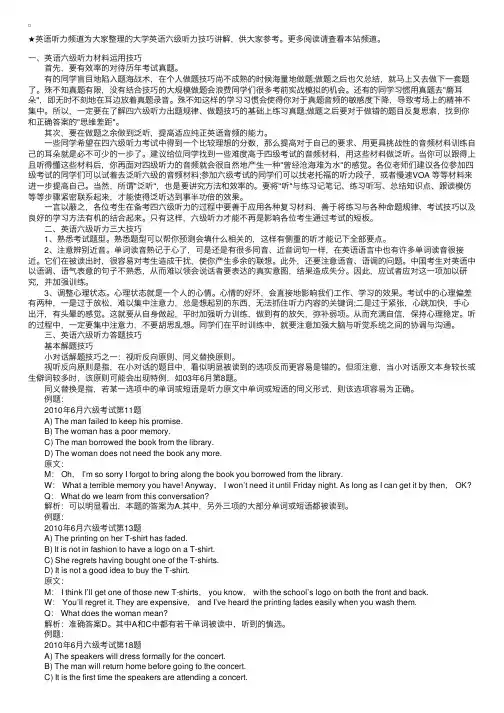
★英语听⼒频道为⼤家整理的⼤学英语六级听⼒技巧讲解,供⼤家参考。
更多阅读请查看本站频道。
⼀、英语六级听⼒材料运⽤技巧 ⾸先,要有效率的对待历年考试真题。
有的同学盲⽬地陷⼊题海战术,在个⼈做题技巧尚不成熟的时候海量地做题;做题之后也⽋总结,就马上⼜去做下⼀套题了。
殊不知真题有限,没有结合技巧的⼤规模做题会浪费同学们很多考前实战模拟的机会。
还有的同学习惯⽤真题去"磨⽿朵",即⽆时不刻地在⽿边放着真题录⾳。
殊不知这样的学习习惯会使得你对于真题⾳频的敏感度下降,导致考场上的精神不集中。
所以,⼀定要在了解四六级听⼒出题规律、做题技巧的基础上练习真题;做题之后要对于做错的题⽬反复思索,找到你和正确答案的"思维差距"。
其次,要在做题之余做到泛听,提⾼适应纯正英语⾳频的能⼒。
⼀些同学希望在四六级听⼒考试中得到⼀个⽐较理想的分数,那么提⾼对于⾃⼰的要求、⽤更具挑战性的⾳频材料训练⾃⼰的⽿朵就是必不可少的⼀步了。
建议给位同学找到⼀些难度⾼于四级考试的⾳频材料,⽤这些材料做泛听。
当你可以跟得上且听得懂这些材料后,你再⾯对四级听⼒的⾳频就会很⾃然地产⽣⼀种"曾经沧海难为⽔"的感觉。
各位⽼师们建议各位参加四级考试的同学们可以试着去泛听六级的⾳频材料;参加六级考试的同学们可以找⽼托福的听⼒段⼦,或者慢速VOA 等等材料来进⼀步提⾼⾃⼰。
当然,所谓"泛听",也是要讲究⽅法和效率的。
要将"听"与练习记笔记、练习听写、总结知识点、跟读模仿等等步骤紧密联系起来,才能使得泛听达到事半功倍的效果。
⼀⾔以蔽之,各位考⽣在备考四六级听⼒的过程中要善于应⽤各种复习材料,善于将练习与各种命题规律、考试技巧以及良好的学习⽅法有机的结合起来。
只有这样,六级听⼒才能不再是影响各位考⽣通过考试的短板。
⼆、英语六级听⼒三⼤技巧 1、熟悉考试题型。
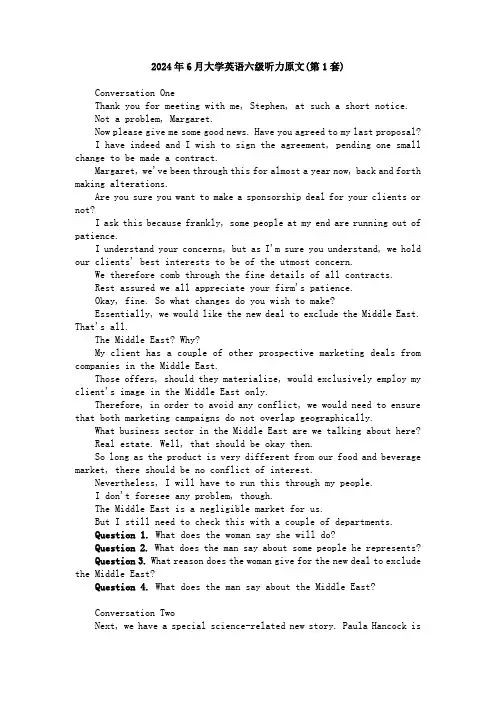
2024年6月大学英语六级听力原文(第1套)Conversation OneThank you for meeting with me, Stephen, at such a short notice.Not a problem, Margaret.Now please give me some good news. Have you agreed to my last proposal?I have indeed and I wish to sign the agreement, pending one small change to be made a contract.Margaret, we've been through this for almost a year now, back and forth making alterations.Are you sure you want to make a sponsorship deal for your clients or not?I ask this because frankly, some people at my end are running out of patience.I understand your concerns, but as I'm sure you understand, we hold our clients' best interests to be of the utmost concern.We therefore comb through the fine details of all contracts.Rest assured we all appreciate your firm's patience.Okay, fine. So what changes do you wish to make?Essentially, we would like the new deal to exclude the Middle East. That's all.The Middle East? Why?My client has a couple of other prospective marketing deals from companies in the Middle East.Those offers, should they materialize, would exclusively employ my client's image in the Middle East only.Therefore, in order to avoid any conflict, we would need to ensure that both marketing campaigns do not overlap geographically.What business sector in the Middle East are we talking about here?Real estate. Well, that should be okay then.So long as the product is very different from our food and beverage market, there should be no conflict of interest.Nevertheless, I will have to run this through my people.I don't foresee any problem, though.The Middle East is a negligible market for us.But I still need to check this with a couple of departments.Question 1. What does the woman say she will do?Question 2. What does the man say about some people he represents?Question 3.What reason does the woman give for the new deal to exclude the Middle East?Question 4. What does the man say about the Middle East?Conversation TwoNext, we have a special science-related new story. Paula Hancock isat the Denver Observatory.Paula, what is the big story over there?Hi, John. Yes, all the astronomers on site here are very excited.In fact, space enthusiasts all across North America and the rest of the Northern Hemisphere will be congregating on mountain tops tonight to watch the night's sky.Why? What's the big event? Is there an eclipse happening soon?Tonight, the Earth will come into close proximity with the Oppenheimer comet.It is the closest our planet has been to such a phenomenon in over 100 years.For this reason, it is expected that thousands of people will gaze up at the sky tonight in order to see this formidable object.How far away is this comet? Will people be able to see it with the naked eye?The Oppenheimer comet will still be millions of miles away on the edge of our galaxy.But nevertheless, this is a relatively close distance, close enough for people to observe in good detail through a telescope.People will only see a blur without one.However, that does not mean one needs professional equipment.Even the most ordinary of telescopes should be conducive for people to observe and wonder at this flying object.Many of our viewers will be wondering how they too can take part in this once-in-a-lifetime event.Where will this comet be in the sky? How can people find it?The comet will be almost exactly due north, at 60 degrees above the equator.However, finding the comet is indeed very tricky.And scientists here have told me there are plenty of phone apps that will facilitate this.How fantastic! Thank you, Paula, for the information.Question 5.What does the woman say about all the astronomers at the Denver Observatory?Question 6.What do we learn from the conversation about the Oppenheimer comet?Question 7. What does the woman say people will only see in the sky without a telescope?Question 8.What do scientists at the Denver Observatory advise amateurs do to facilitate their observation?Passage OneDietary guidelines form the basis for nutrition advice and regulations around the world.While there is strong scientific consensus around most existing guidelines, one question has recently stirred debate: should consumers be warned to avoid ultra-processed foods?Two papers published today in the American Journal of Clinical Nutrition outline the case for and against using the concept of "ultra-processed foods" to help inform dietary guidelines, beyond conventional food classification systems.The authors, Carlos Monteiro of the University of Sao Paulo and Arna Ostrup of Novo Nordisk Foundation, will discuss the issue in a live virtual debate, August 14th, during NUTRITION 2024 Live Online.The debate centers around a system developed by Monteiro and colleagues that classifies foods by their degree of industrial processing, ranging from unprocessed to ultra-processed.The system defines ultra-processed foods as those made using sequences of processes that extract substances from foods and alter them with chemicals in order to formulate the final product.Ultra-processed foods are characteristically designed to be cheap, tasty, and convenient.Examples include soft drinks and candy, packaged snacks and pastries, ready to heat products, and reconstituted meat products.Studies have linked consumption of ultra-processed foods, which are often high in salt, sugar, and fat, with weight gain and an increased risk of chronic diseases, even after adjusting for the amount of salt, sugar, and fat in the diet.While the mechanisms behind these associations are not fully understood, Monteiro argues that the existing evidence is sufficient to justify discouraging consumption of ultra-processed foods in dietary recommendations and government policies.Question 9. What question is said to have recently stirred debate?Question 10.How does the system developed by Monteiro and colleagues classify foods?Question 11.What is consumption of ultra-processed foods linked with, according to studies?Passage TwoBelieve it or not, human creativity benefits from constraints.According to psychologists, when you have less to work with, you actually begin to see the world differently.With constraints, you dedicate your mental energy to acting more resourcefully.When challenged, you figure out new ways to be better.The most successful creative people know that constraints give their minds the impetus to leap higher.People who invent new products are not limited by what they don't haveor can't do.They leverage their limitations to push themselves even further.Many products and services are created because the founders saw a limitation in what they use.They created innovation based on what was not working for them at the moment.Innovation is a creative person's response to limitation.In a 2015 study which examined how thinking about scarcity or abundance influences how creatively people use their resources, Ravi Mehta at the University of Illinois and Meng Zhu at Johns Hopkins University found that people simply have no incentive to use what's available to them in novel ways.When people face scarcity, they give themselves the freedom to use resources in less conventional ways because they have to.Obstacles can broaden your perception and open up your thinking processes.Consistent constraints help you improve the connecting unrelated ideas and concepts.Marissa Meyer, former vice president for search products and user experience at Google, once wrote in a publication on Bloomberg, "Constraints shape and focus problems and provide clear challenges to overcome; creativity thrives best when constrained."Question 12.What do psychologists say people do when they are short of resources?Question 13. What does the passage say about innovation?Question 14. What did a 2015 study by Ravi Mehta and Meng Zhu find?Question 15.What did Marissa Meyer once write concerning creativity?Recording OneDifferent people use different strategies for managing conflicts.These strategies are learned in childhood.Usually, we are not aware of how we act in conflict situations.We just do whatever seems to come naturally.But we do have a personal strategy, and because it is learned, we can always change it by learning new and more effective ways of managing conflicts.When you get involved in a conflict, there are two major concerns you have to take into account: achieving your personal goals and keeping a good relationship with the other person.How important your personal goals are and how important the relationship is to you affect how you act in a conflict.Given these two concerns, five styles of managing conflicts can be identified.1. The turtle.Turtles withdraw into their shells to avoid conflicts.They give up their personal goals and relationships.They believe it is easier to withdraw from a conflict than to face it.2. The shark.Sharks try to overpower opponents by forcing them to accept their solution to the conflict.They seek to achieve their goals at all costs.Sharks assume that conflicts are settled by one person winning and one person losing.Winning gives sharks a sense of pride and achievement.Losing gives them a sense of weakness, inadequacy, and failure.3. The teddy bear.Teddy bears want to be accepted and liked by other people.They think that conflict should be avoided in favor of harmony, and believe that conflicts cannot be discussed without damaging relationships.They give up their goals to preserve the relationship.4. The fox.Foxes are moderately concerned with their own goals and about their relationships with other people.They give up part of their goals and persuade the other person in a conflict to give up part of his goals.They seek a solution to conflicts where both sides gain something.5. The owl.Owls view conflicts as problems to be solved.They see conflicts as improving relationships by reducing tension between two people.They try to begin a discussion that identifies the conflict as a problem.By seeking solutions that satisfy both themselves and the other person, owls maintain the relationship.Owls are not satisfied until a solution is found that achieves their own goals and the other person's goals, and they are not satisfied until the tensions and negative feelings have been fully resolved.Question 16.Why does the speaker say strategies for managing conflicts can always be changed?Question 17.What is said to affect the way one acts in a conflict?Question 18. Of the five styles the speaker discusses, which views conflicts as problems to be solved?Recording TwoThe genetic code of all 1.5 million known species of animals and plants living on Earth will be mapped to help save species from extinction andboost human health.Scientists hope that cracking the genetic code of plants and animals could help uncover new treatments for infectious diseases, slow aging, improve crops and agriculture, and create new bio-materials.In Britain, organisations including the Natural History Museum, the Royal Botanic Gardens at Kew and the Wellcome Sanger Institute have joined forces to sequence Britain's 66,000 species of animals and plants.Dubbed the Darwin Tree of Life Project, it is expected to take 10 years and cost 100 million pounds.Once completed, all the information will be publicly available to researchers.Many scientists believe that Earth has now entered the sixth mass extinction, with humans creating a toxic mix of habitation loss, pollution and climate change, which has already led to the loss of at least 77 species of mammals and 140 types of birds since 1500.It is the biggest loss of species since the dinosaurs were wiped out 66 million years ago.Scientists say that sequencing every species will revolutionize the understanding of biology and evolution, bolster efforts to conserve as well as protect and restore biodiversity.Dr. Tim Littlewood, head of Life Sciences Department at the Natural History Museum said, "Whether you are interested in food or disease, the history of how every organism on the planet has adapted to its environment is recorded in its genetic makeup.How you then harness that is dependent on your ability to understand it.We will be using modern methods to get a really good window on the present and the past.And of course, a window on the past gives you a prospective model on the future."Sir Jim Smith, Director of Science at Wellcome said, "Try as I might, I can't think of a more exciting, more relevant, more timely, or more internationally inspirational project.Since 1970, humanity has wiped out 60 percent of animal populations.About 23,000 of 80,000 species surveyed are approaching extinction.We are in the midst of the sixth great extinction event of life on our planet, which not only threatens wildlife species, but also imperils the global food supply.As scientists, we all realize we desperately need to catalogue life on our fragile planet now.I think we're making history."Question 19.What do scientists hope to do by cracking the genetic code of plants and animals?Question 20. What do many scientists believe with regard to Earth?Question 21.How does Sir Jim Smith, Director of Science at Wellcome, describe the Darwin Tree of Life Project?Recording ThreeJohn Donne, the English poet, wrote in the 17th century, "No man is an island, entire of itself; every man is a piece of the continent, a part of the main."Now, a British academic has claimed that human individuality is indeed just an illusion, because societies are far more interconnected at a mental, physical, and cultural level than people realize.In his new book, The Self Delusion, Professor Tom Oliver, a researcher in the Ecology and Evolution group at the University of Reading, argues there is no such thing as "self", and not even our bodies are truly "us".Just as Copernicus realized the Earth is not the center of the universe, Professor Oliver said society urgently needs a Copernican-like revolution to understand people are not detached beings but rather part of one connected identity."A significant milestone in the cultural evolution of human minds was the acceptance that the Earth is not the center of the universe, the so-called Copernican Revolution," he writes.However, we have one more big myth to dispose of: that we exist as independent selves at the center of a subjective universe.You may feel as if you are an independent individual acting autonomously in the world; that you have unchanging inner self that persists throughout your lifetime, acting as a central anchor-point with the world changing around you.This is the illusion I seek to tackle. We are intimately connected to the world around us."Professor Oliver argues there are around 37 trillion cells in the body but most have a lifespan of just a few days or weeks, so the material "us" is constantly changing.In fact, there is no part of your body that has existed for more than ten years.Since our bodies are essentially made anew every few weeks, the material in them alone is clearly insufficient to explain the persistent thread of an identity.Professor Oliver claims that individualism is actually bad for society, and only by realizing we are part of a bigger entity can we solve pressing environmental and societal problems.Through selfish over-consumption we are destroying the natural world and using non-renewable resources at an accelerating rate."We are at a critical crossroads as a species where we must rapidly reform our mindsets and behavior to act in less selfish ways," he said."So let's open our eyes to the hidden connections all around us."Question 22. What is indeed just an illusion according to Professor Tom Oliver?Question 23. What does Professor Tom Oliver think of the idea that we exist as independent selves at the center of a subjective universe?Question 24. Why does Professor Tom Oliver claim that the material "us"is constantly changing?Question 25. How can we solve pressing environmental and societal problems according to Professor Tom Oliver?。
2021六级12月第三套解析听力部分:Section A本节听力主要涉及到一个女士去咨询旅行信息的对话。
女士在对话中提出了四个问题,包括:最佳旅行时间、旅行费用、路线规划以及目的地的许可证要求。
其中,目的地的许可证要求是对话的重点部分。
通过仔细听对话,可以知道女士需要提供哪些材料来申请许可证。
答案如下:1. Time:第一份材料需要提供两周时间。
答案:B。
2. Cost:第二份材料需要支付10美元。
答案:C。
3. Route:第三份材料需要提供预订的酒店和车辆信息。
答案:B。
4. Permit:第四份材料需要填写个人信息、旅行计划和目的地的地址。
答案:C。
Section B本节听力主要涉及到一篇科普讲座,讲座的主题是关于大脑的。
在讲座中,主讲人介绍了一种大脑波的现象,即"Alpha waves",以及Alpha waves对大脑和健康的积极影响。
听力中出现了一些与Alpha waves相关的词汇,如relaxation(放松)、meditation(冥想)等。
根据听力内容,可以得出以下问题的答案:5. What is the main topic in the lecture?答案:A。
6. What can Alpha waves help people achieve?答案:C。
7. Where are Alpha waves produced?答案:B。
8. How can people increase Alpha waves?答案:A。
Section C本节听力主要涉及到一个学生在图书馆咨询图书信息的对话。
学生需要找到两本书来完成自己的研究报告。
对话中提及了这两本书的名称,如The Global Financial Crisis以及Marketing and Consumer Behavior,同时也提到了这两本书在图书馆的位置。
通过仔细听对话,可以知道这两本书所在的书架。
英语六级新题型听力试题:讲座讲话英语六级新题型听力试题:讲座/讲话新改革的`英语六级考试中,听力和阅读部分依然占据很高的分数比例,以下是yjbys网店铺整理的关于英语六级新题型听力试题:讲座/讲话,供大家备考。
讲座/讲话样题(听力原文见页底)Section CDirections: In this section, you will hear recordings of lectures or talks followed by some questions. The recordings will be played only once. After you hear a question, you must choose the best answer from the four choices marked A), B), C) and D). Then mark the corresponding letter on Answer Sheet 1 with a single line through the centre.Now listen to the following recording and answer questions 16 to 19.16.A) They investigate the retirement homes in America.B) They are on issues facing senior citizens in America.C) They describe the great pleasures of the golden years.D) They are filled with fond memories of his grandparents.17.A) The loss of the ability to take care of himself.B) The feeling of not being important any more.C) Being unable to find a good retirement home.D) Leaving the home he had lived in for 60 years.18.A) The loss of identity and self-worth.B) Fear of being replaced or discarded.C) Freedom from pressure and worldly cares.D) The possession of wealth and high respect.19.A) The urgency of pension reform.B) Medical care for senior citizens.C) Finding meaningful roles for the elderly in society.D) The development of public facilities for senior citizens.Now listen to the following recording and answer questions 20 to 22.20.A) It seriously impacts their physical and mental development.B) It has become a problem affecting global economic growth.C) It is a common problem found in underdeveloped countries.D) It is an issue often overlooked by parents in many countries.21.A) They will live longer.B) They get better pay.C) They get along well with people.D) They develop much higher IQs.22.A) Appropriated funds to promote research of nutrient-rich foods.B) Encouraged breastfeeding for the first six months of a child’s life.C) Recruited volunteers to teach rural people about health and nutrition.D) Targeted hunger-relief programs at pregnant women andyoung children.Now listen to the following recording and answer questions 23 to 25.23.A) The guaranteed quality of its goods.B) The huge volume of its annual sales.C) The service it provides to its customers.D) The high value-to-weight ratio of its goods.24.A) Those having a taste or smell component.B) Products potentially embarrassing to buy.C) Those that require very careful handling.D) Services involving a personal element.25.A) Those who live in the virtual world.B) Those who have to work long hours.C) Those who are used to online transactions.D) Those who don’t mind paying a little more.讲座/讲话答案Section C16. B 17. D 18. A 19. C 20. A21. B 22. C 23. D 24. A 25. B讲座/讲话原文Section CDirections: In this section, you will hear recordings of lectures or talks followed by some questions. The recordings will be played only once. After you hear a question, you must choose the best answer from the four choices marked A), B), C) and D). Then mark the corresponding letter on Answer Sheet 1 with a single line through the centre.Now listen to the following recording and answer questions 16 to 19.Moderator:Hello Ladies and Gentleman, it gives me great pleasure to introduce our keynote speaker for today’s session, Dr. Howard Miller. Dr. Miller, Professor of Sociology at Washington University, has written numerous articles and books on the issues facing older Americans in our graying society for the past 15 years. Dr. Miller:Dr. Miller:Thank you for that introduction. Today, I’d like to preface my remarks with a story from my own life which I feel highlights the common concerns that bring us here together. Several years ago when my grandparents were well into their eighties, they were faced with the reality of no longer being able to adequately care for themselves. My grandfather spoke of his greatest fear, that of leaving the only home they had known for the past 60 years. Fighting back the tears, he spoke proudly of the fact that he had built their home from the ground up, and that he had pounded every nail and laid every brick in the process. The prospect of having to sell their home and give up their independence, and move into a retirement home was an extremely painful experience for them. It was, in my grandfather’s own words, like having a limb cut off. He exclaimed in a forceful manner that he felt he wasn’t important anymore.For them and some older Americans, their so-called “golden years” are at time s not so pleasant, for this period can mean the decline of not only one’s health but the loss of identity and self-worth. In many societies, this self-identity isclosely related with our social status, occupation, material possessions, or independence. Furthermore, we often live in societies that value what is “new” or in fashion, and our own usage of words in the English language is often a sign of bad news for older Americans. I mean how would your family react if you came home tonight exclaiming, “Hey, come to the living room and see the OLD black and white TV I brought!” Unfortunately, the word “old” calls to mind images of the need to replace or discard.Now, many of the lectures given at this conference have focused on the issues of pension reform, medical care, and the development of public facilities for senior citizens. And while these are vital issues that must be addressed, I’d like to focus my comments on an important issue that will affect the overall success of the other programs mentioned. This has to do with changing our perspectives on what it means to be a part of this group, and finding meaningful roles the elderly can play and should play in our societies.First of all, I’d like to talk about . . .16. What does the introduction say about Dr. Howard Miller’s articles and books?17. What is the greatest fear of Dr. Miller’s grandfather?18. What does Dr. Miller say the “golden years” can often mean?19. What is the focus of Dr. Miller’s speech?Now listen to the following recording and answer questions 20 to 22.The 2010 Global Hunger Index report was released today by the International Food Policy Research Institute (IFPRI). It notes that, in recent years, experts have come to the conclusion thatundernourishment between conception and a c hild’s second birthday can have serious and long-lasting impacts.Undernourishment during this approximately 1,000-day window can seriously check the growth and development of children and render them more likely to get sick and die than well-fed children. Preventing hunger allows children to develop both physically and mentally.Says IFPRI’s Marie Ruel, “They will be more likely to perform well in school. They will stay in school longer. And then at adulthood, IFPRI has actually demonstrated that children who were better nourished have higher wages, by a pretty large margin, by 46 percent.”Ruel says that means the productivity of a nation’s future generations depends in a large part on the first 1,000 days of life.“This is why we’re all on board in focusi ng on those thousand days to improve nutrition. After that, the damage is done and is highly irreversible.”The data on nutrition and childhood development has been slowly coming together for decades. But Ruel says scientific consensus alone will not solve the problem.“It’s not enough that nutritionists know you have to intervene then, if we don’t have the politicians on board, and also the...people that implement [programs] in the field.”Ruel says there are encouraging signs that politicians and implementers are beginning to get on board. Many major donors and the United Nations are targeting hunger-relief programs at pregnant women and young children. They focus on improving diets or providing micro-food supplements. They improve access to pre-birth care and encourage exclusive breastfeeding for the first six months of a child’s life.Ruel says in the 1980s Thailand was able to reduce child undernourishment by recruiting a large number of volunteers to travel the countryside teaching about health and nutrition.“They really did very active promotion of diversity in the diet and good eating habits. So they were providing more food to people, but also educating people on how to use them, and also educating people on how to feed their young children.”Ruel says countries may take different approaches to reducing child undernutrition. But she says nations will not make progress fighting hunger and poverty until they begin to focus on those critical first thousand days.20. What is the experts’ conclusion regarding children’s undernourishment in their earliest days of life?21. What does IFPRI’s Marie Ruel say about well-fed children in their adult life?22. What did Thailand do to reduce child undernourishment in the 1980s?Now listen to the following recording and answer questions 23 to 25.I’d like to look at a vital aspect of e-commerce, and that is the nature of the product or service. There are certain products and services that are very suitable for selling online, and others that simply don’t work.Suitable products generally have a high value-to-weight ratio. Items such as CDs and DVDs are obvious examples. Books, although heavier and so more expensive to post, still have a high enough value-to-weight ratio, as the success of Amazon, which started off selling only books, shows. Laptop computers are another good product for selling online.Digital products, such as software, films and music, can besold in a purely virtual environment. The goods are paid for by online transactions, and then downloaded onto t he buyer’s computer. There are no postage or delivery costs, so prices can be kept low.Many successful virtual companies provide digital services, such as financial transactions, in the case of Paypal, or means of communication, as Skype does. The key to success here is providing an easy-to-use, reliable service. Do this and you can easily become the market leader, as Skype has proved.Products which are potentially embarrassing to buy also do well in the virtual environment. Some of the most profitable e-commerce companies are those selling sex-related products or services. For a similar reason, online gambling is highly popular.Products which are usually considered unsuitable for selling online include those that have a taste or smell component. Food, especially fresh food, falls into this category, along with perfume. Clothes and other items that need to be tried on such as diamond rings and gold necklaces are generally not suited to virtual retailing, and, of course, items with a low value-to-weight ratio.There are exceptions, though. Online grocery shopping has really taken off, with most major supermarkets offering the service. The inconvenience of not being able to see the food you are buying is outweighed by the time saved and convenience of having the goods delivered. Typical users of online supermarkets include the elderly, people who work long hours and those without their own transport.23 What is important to the success of an online store?24. What products are unsuitable for selling online?25. Who are more likely to buy groceries online?下载全文。
六级真题听力星火答案解析【引子】在大学英语六级考试中,听力部分通常是考生们最为头疼的一环。
其中,星火听力真题答案解析因其全面准确、细致入微的特点备受考生关注。
本文将为你带来一份1500字左右的文章,无论你是对答案解析感兴趣还是想提高自己的听力技巧,相信本文都能帮到你。
【正文】一、回忆解析岗位在星火的答案解析中,回忆解析岗位通常是第一个篇章。
此篇文章会提供一个学生的面试回忆,并给出正确答案和详细解析,帮助考生更好地理解听力文本。
这一部分经常涉及到校园生活、社交交流以及学术讨论等话题,对于平时关注这些方面的准备非常有帮助。
例如,听力材料中的学生回忆可能会具体描述面试官问到他的专业领域,如: "Tell me about your major and why you chose it."(请介绍一下你的专业,以及为什么选择这个专业。
)在答案解析中会给出相应的回答:“I'm majoring i n International Relations, because I've always been interested in global politics and want to pursue a career in diplomacy…”(我的专业是国际关系,因为我一直对全球政治很感兴趣,希望从事外交事业……)二、学术讲座学术讲座是六级听力常见的一种题型,也是很多考生面临的难题。
通常,题材会涉及到经济、科技、社会等方面的内容,对于相关专业的考生来说是一个不错的提升自己听力技巧的机会。
答案解析中,会对讲座中出现的专业术语、概念进行解析,如"carbon footprint"(碳足迹) "nuclear fusion"(核聚变)等等。
同时,讲座中常见的干扰性选项也会被分析,帮助考生辨别出正确的答案。
三、学生对话学生对话是听力部分中难度较低的一种题型,它模拟了学生在校园内的日常对话,对于考生来说比较贴近生活。
关于英语六级听力讲座应试技巧分享我相信,考过六级的孩子应该都会对听力中的讲座短文深恶痛绝,不仅篇幅长而且单词难,很容易听着听着就走神了。
为了拯救我们大家,今天小编就来和大家分享一下关于听力讲座究竟要怎么做。
首先,要集中精力听准英语六级听力文章的开头部分。
在每篇讲座开始之前都会对整篇讲座内容作简短的开篇介绍,一般为一句话:Listen to part of the lecture in X class, the professor is talking about Y. 这里的X——学科名称,以及Y——主要内容,相当于给讲座内容指出了一个大的方向。
正式讲座开始后,先要注意听其主题,大多数的教授都会在课程开始时开门见山,点明主题。
例如:Today we will talk about…或者T oday we will focus on…, on或者about后面的内容要重点把握,这就是整篇文章的核心内容,可以帮助我们迅速抓住文章的主题。
其次,在抓住英语六级听力文章主题后,对可能听到的内容进行积极预测。
把握文章主题之后,要立刻集中精力抓住段落中的关键词和核心概念,迅速激活自己在该学术领域的相关知识,对可能听到的内容进行合理预测。
例如:如果讲座将介绍火山的相关知识,那么应该迅速预测接下来可能会听到火山的分类、不同类别火山的喷发时间、所在地点以及危害性等等。
这样带有“主动性”的去听,会对理解文章内容有很大帮助。
当然,这种主动预测的能力是要建立在平时多听、多总结、多积累的基础之上的。
第三,抓住要点记英语六级听力笔记。
记笔记是英语六级听力的必修课。
讲座文章篇幅较长,也就是所包含的信息量较大,而文章的后面又会考察我们一些细节信息。
在这种情况下,光凭大脑记忆是绝对不够的,必须拥有边听边记笔记的能力才能应对后面的题目。
在记笔记时,要重点把握文章的一些细节信息点,例如:时间、名词、举例等等。
对重要细节信息点要做到熟悉、敏感,并且可以迅速记录。
2023年六月大学英语六级考试真题听力Title: 2023 June CET-6 Listening TestIntroduction:The 2023 June College English Test (CET-6) Listening section is a crucial component of the exam that assesses a candidate's ability to understand and comprehend spoken English. In this article, we will delve into the types of questions that may be encountered in the listening test, as well as provide tips on how to effectively prepare for this section.Types of Questions:1. Multiple Choice: Candidates will be required to choose the correct answer from a set of options based on the information provided in the audio clip.2. Fill in the Blanks: Candidates will need to fill in the missing information in a sentence or passage based on what they hear.3. True/False/Not Given: Candidates will have to determine whether statements provided are true, false, or not given based on the information in the audio clip.4. Matching: Candidates will need to match information provided in the audio clip to corresponding options given.Tips for Preparation:1. Practice regularly: Listening to English podcasts, watching English movies, and practicing with past listening tests can help improve your listening skills.2. Focus on key words: Pay attention to keywords and phrases that can help you understand the main ideas and relevant details in the audio clip.3. Familiarize yourself with different accents: Expose yourself to different English accents to improve your ability to understand various speakers.4. Time management: Practice answering questions within the allocated time to ensure you can complete the listening section in the exam.Conclusion:The 2023 June CET-6 Listening test is an important part of the exam that requires candidates to have a strong grasp of listening skills. By practicing regularly, focusing on key words, familiarizing yourself with different accents, and managing your time effectively, you can improve your performance in this section and increase your chances of success in the exam. Good luck!。
讲座练习第一篇Now listen to the following recording and answer questions 16 to 19.16. A) Political values of a people. C) Culture differences.B) People’s religious beliefs. D) Politics, economics and war.17. A) A soldier’s survival from wars.B) The shooting at a number of painters.C) Soldiers shooting a group of simple people.D) Francisco Goya’s interesting experience s in Spain.18. A) The absence of human and animal images.B) The description of people and stories from the Bible.C) The absence of flowers and geometric forms.D) The buildings decorated with images of landscape.19. A) Modern artists are more acceptable than traditional artists.B) Traditional art and modern art have their own characteristics.C) Traditional culture can only be preserved through internationalizationD) Art reflects social changes that take place as different cultures influence one another. Now listen to the following recording and answer questions 20 to 22.20. A) Because they are unsatisfied with their work.B) Because they need to take care of their children.C) Because they are in companies with loose management.D) Because they don’t take their work seriously.21. A) Male colleagues in their 30s. C) Younger colleagues in their 20s.B) Managers of the company. D) Older colleagues in their 50s.22. A) Fairness and equality were not paid due attention to.B) Employees without children could have their voice better heard.C) Managers had a good knowledge of the relevant laws.D) Women could be in an unfavorable position in career development.Now listen to the following recording and answer questions 23 to 25.23. A) The excessive emission of automobile exhausts.B) The unrestrained field burning during the dry season.C) The overuse of coal in industry and city life.D) The large amounts of flowing dust in various construction sites.24. A) The acute shortage of timber for fuel and furniture.B) The urgent need for more construction land for roads and houses.C) The objective requirements of developing paper-making industry.D) The conversion of forest for commercial agriculture,25. A) Do nothing but wait for the monsoon season to drive the haze away.B) Add rain-making and forest fire runs to alleviate the particles of dust.C) Ask their neighboring countries to stop the forest fires and make a boundary fire line.D) Hand out health pamphlets and teach patients how to wear the mask properly.讲座练习第二篇Now listen to the following recording and answer questions 16 to 19.16. A) They describe how habits affect our behavior.B) They are on issues facing office workers today.C) They investigate the functions of the brain.D) They reveal how memories are developed.17. A) It enabled the researchers to track participants’ memories.B) It provided exciting images of famous people and places.C) It stimulated volunteers’ memories of a given moment.D) It caused subjects to forget their memories for a while.18. A) Because they could bring a special feeling to the participants.B) Because they could produce a desirable experimental result.C) Because they could stimulate participant’s bold imagination.D) Because they could evoke sweet memories in people’s mind.19. A) Words trigger a memory better than images and pictures.B) Forgetting caused by remembering occurs in an instant.C) Brain activity is suppressed when pictures are shown.D) The researchers can watch how the brain suppresses memories.Now listen to the following recording and answer questions 20 to 22.20. A) It makes more children under five suffer from diseases related with malnutrition.B) It makes about two billion people die from diarrhea each year.C) It leads to poor quality of life and environmental health problems.D) It slows the economic growth of the whole world.21. A) The booming economy helps all the people in India shake off poverty.B) The rapid urbanization is the biggest obstacle hindering its further development.C) India is bound to embrace a rapid economic development soon.D) Government should put the priority on sanitation and clean water for economicdevelopment.22. A) It will share expertise and global practices with other partners about urban water andsanitation.B) It will help bring clean water and sanitation services to all Indians.C) It will demonstrate innovative models in environmental pollution and sanitation.D) It will provide funds to support water and sanitation efforts in India.Now listen to the following recording and answer questions 23 to 25.23. A) They could pay less housing rent in Chinatown.B) They encountered language and cultural barriers.C) They wanted to experience Chinese culture.D) They could get government subsidy by living there.23. A) They plan to rent their houses to new immigrants.B) They are going to sell their houses.C) They may replace their houses with high-rise apartments.D) They intend to keep their houses for private use.24. A) Chinatown is important in preserving Chinese culture.B) Chinatown is advantageous to the Sino-foreign cultural exchanges.C) Chinatown is helpful to spread Chinese culture.D) Chinatown can make Chinese abroad experience Chinese culture.Now listen to the following recording and answer questions 16 to 19.16. A) They will help listeners acquire more knowledge.B) They will make other people feel relaxed and comfortable.C) They must be learned in practice.D) They can help turn strangers into close friends.17. A) They don’t want to be considered impolit e.B) They try to show their rich knowledge.C) They are afraid of being left behind.D) They want to become more outgoing than before.18. A) Speaking loudly. C) Laughing a lot to ease others’ discomfort.B) Making clear their points. D) Showing warming and friendly feelings.19. A) A big and warm hug. C) A special and meaningful gift.B) A good wish for others. D) A smile and a sincere handshake.Now listen to the following recording and answer questions 20 to 22.20. A) Enough cash flow to support companies.B) A responsible attitude to their employees.C) Their nimbleness in doing business.D) Their ability of getting rid of government intervention.21. A) The increasingly expensive health care which is difficult to get at reasonable rates.B) The paying of various high taxes to attract and keep his employees.C) Huge financial loss due to potential investment risks.D) The potential wage inflation because of unstable economic conditions.22. A) They are anxious about the development of small businesses.B) They are optimistic about the conditions of small businesses.C) They are cautious about economic conditions and hesitate to invest.D) They are uncertain about the future of small businesses.Now listen to the following recording and answer questions 23 to 25.23. A) An hour of jogging at a local park.B) An hour of fast walking and an hour of running at a local park.C) Going to a gym for two or three hours’ muscle training.D) Taking part in the road race and the race walk.24. A) She won a gold medal in pickleball at the 2013 National Senior Games.B) She plays pickleball and teaches the sport to senior groups.C) Her fitness result showed that she was just 44 years old.D) She didn’t take sports more seriously until she turned 50.25. A) It helps people know the benefits of being fit and healthy.B) It encourages more people to become competitors.C) It leads old people to start taking exercise right now.D) It gives people a reason to take good care of themselves.Now listen to the following recording and answer questions 16 to 19.16. A) When they grow up in a particular set of surroundings.B) When they travel to another country that they’re not familiar with.C) When they become totally dependent on the rules of their social group.D) When they start to learn a foreign language.17. A) They are frequently questioned by people unwilling to accept them.B) They differ greatly among different social groups.C) They govern the behavior of people who are dependent on them.D) They are clearly articulated and their impact is always understood.18. A) People are shocked by the difference between the foreign culture and their own.B) The attitude to visitors of the people in a foreign country is really cold.C) The foreign culture that people experience may be totally different from what theyimagined.D) People may run into budget shortfalls when travel to another country.19. A) They often drive along a highway in the dark.B) They often behave rationally without stress.C) They need a road map to guide their behavior.D) They’re totally out of control and feel highly stressful.Now listen to the following recording and answer questions 20 to 22.20. A) You can find a job by just poring over help-wanted ads.B) Looking for a job means knocking on the door and asking.C) College graduates can find a job at any point of time online.D) Finding a job becomes much easier for college graduates.21. A) There won’t be enough job vacancy online.B) There will be a 3.7 million increase in job openings before long.C) The job picture will be brighter with economic recovery.D) Two million new jobs will be posted online on a daily basis.22. A) She found her dream job as an education policy researcher.B) Lack of perseverance, she got nowhere in finding a job.C) She failed in job-hunting for not having applied for enough positions.D) She felt that her Master’s degree was not helpful at all.Now listen to the following recording and answer questions 23 to 25.23. A) It may result in a rise in the rates of infectious diseases.B) It may give rise to a breakdown in sanitation.C) It may lead to decreases in agricultural productivity.D) It may bring about immediate increases in hospital admissions.24. A) Decreasing the reliance on cars and motor vehicles.B) A shift from coal-fired power plants to renewable energy.C) Encouraging active transportation like cycling and walking.D) A commitment to a strong global climate treaty.25. A) The World Health Organization. C) Environmentalists.B) The Lancet Commission. D) Professionals in health care.Now listen to the following recording and answer questions 16 to 18.16. A) America-s colleges and universities. C) Technical and managerial work force.B) Important and successful national leaders. D) Excellent professional work force.17. A) The state government. C) The local government.B) The federal government. D) The National Academy of Science.18. A) The Land Grant College Act.B) The Act of 1914.C) The Federal Family Education Loan Program.D) The Servicemen’s Readjustment Act of 1944.Now listen to the following recording and answer questions 19 to 21.19. A) Jones. B) Smith. C) Campbell. D) Webber.20. A) Electoral register. B) Webber. C) Lerwick. D) Ex-pairing.21. A) For they are non-British names.B) For they only have 25,000 names on website.C) For most people get their names from their ancestors.D) For 25,000 names are difficult to generalize.Now listen to the following recording and answer questions 22 to 25.22. A) Land formation. C) Good dating.B) Geologic feature. D) Fundamental technique.23. A) Geologists had a pretty good idea of the Grand Canyon.B) United States was formed 150 million years ago.C) United States was formed from sandstone.D) The sand had come from an ancient mountain range.24. A) Uranium-Lead Dating. C) The sand from the Grand Canyon.B) Appalachian Mountains. D) Huge rivers carried the sand west.25. A) To prove earth’s continents were once joined together.B) To prove that the grain type within sandstone.C) To determine the actual particles in the sandstone.D) To determine where the actual particles came from.。